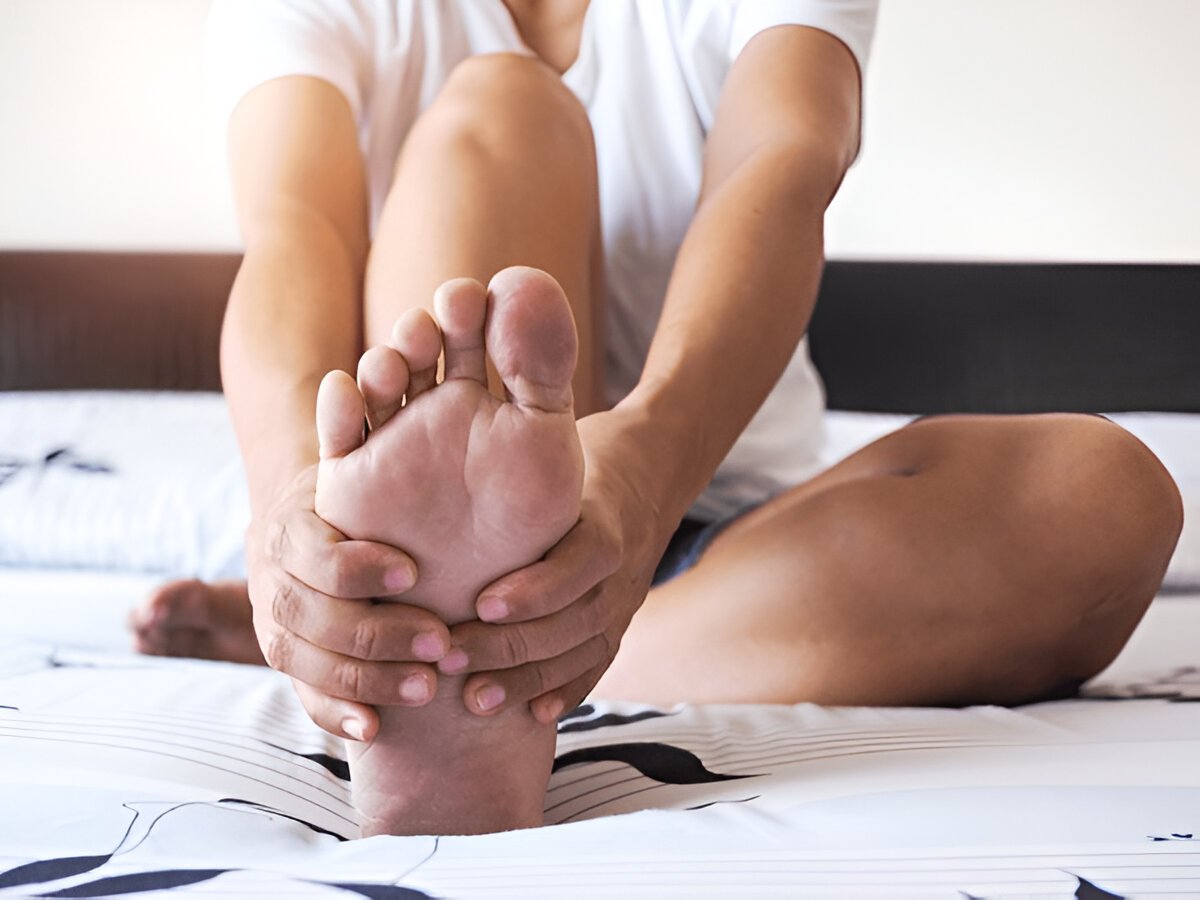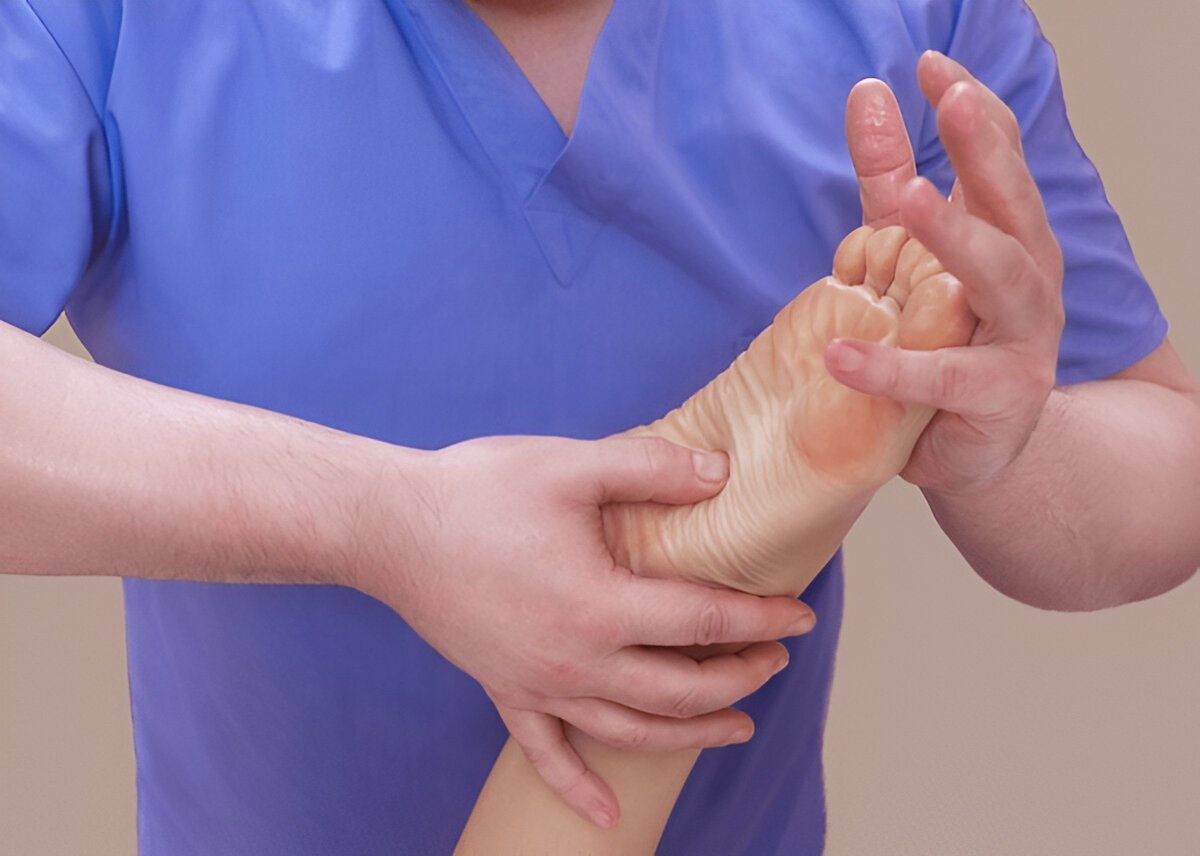Plantar Fasciitis Treatment
Heel pain can hit at the worst time. Some people feel it the moment they get out of bed. Others notice a sharp pull in the heel during walks, gym sessions, or right after a long day of standing. Many patients tell us, “It felt like someone was poking my heel with a stone inside my shoe.”
If that sounds familiar, you may have plantar fasciitis, one of the most common causes of heel pain we see at Rapid Physiocare.
Our physiotherapists help hundreds of patients to overcome this condition without aggressive treatment or unnecessary time off. Whether you want to walk pain-free again, get back to running, or just stop dreading your first steps in the morning, we will guide you through a treatment plan that’s specific to you.

What is Plantar Fasciitis?
It’s a dense strip of connective tissue that upholds the arch of your foot. When this tissue becomes irritated or overloaded, it leads to inflammation and micro-tears. That’s when heel pain starts to appear, especially during weight bearing activities.
Many patients described it as
- Pain in the heel of the foot when walking
- A sharp pain during the first few steps after rest
- Persistent heel pain after running or long days
- A dull ache at the back of the heel
- Tightness in the arch
Plantar fasciitis usually builds up over time, especially if you’ve been training harder, standing more, or using worn-out footwear.
Common Symptoms
People often come to our clinic thinking they “just strained something,” only to realize the symptoms point directly to plantar fasciitis.
These symptoms include:
1. Morning heel pain
That first step out of bed can be a shock. As the fascia tightens overnight, it becomes more sensitive when stretched out.
2. Pain during or after activity
Running, walking fast, and long hours on your feet all can cause pain.
3. Tenderness on the arch
Tightness or a pulling sensation on the bottom of the foot.
4. Pain on the heel of the foot after rest
Sitting for long periods and then standing up suddenly can cause the tissue to flare up again.
5. Stiffness
The foot feels tight and uncomfortable.
But don’t worry, heel pain is treatable, and early care means faster recovery.
Why Plantar Fasciitis Happens
There’s no one reason. It’s usually a combination of lifestyle, biomechanics and daily habits. Some common causes include:
- Overuse from running or jumping
- Flat feet or high arches
- Tight calf muscles
- Poor footwear with weak cushioning
- Sudden increase in exercise intensity
- Standing long hours on hard surfaces
- Weight changes that strain the foot
At Rapid Physiocare, we take time to understand your specific trigger so we can treat the root cause, not just the symptoms.
How We Diagnose
During your visit, our physiotherapist will:
- Ask about your pain history
- Examine your walking pattern (gait analysis)
- Assess foot and ankle mobility
- Check muscle tightness and strength
- Identify irritants and pain triggers
This detailed assessment helps us create a personalized plan rather than a standard approach.
Treatment at Rapid Physiocare
Our approach is evidence-based physiotherapy and for long-term recovery.
1. Manual Therapy
Gentle therapeutic techniques such as soft tissue release, myofascial release and joint mobilization to reduce tension and restore movement in the foot and ankle.
2. Targeted Exercises
Your physiotherapist will guide you through specific exercises to strengthen the arch and calf flexibility and reduce strain on the fascia. These exercises are the foundation of long-term recovery.
3. Shockwave Therapy (if required)
For stubborn or chronic heel pain, shockwave therapy can stimulate healing in the tissue. It’s non-invasive and well researched.
4. Taping and Foot Support
Taping techniques reduce immediate pain by supporting the arch while you move. Some patients may benefit from insoles, which we recommend based on foot mechanics.
5. Education & Lifestyle Corrections
We help you understand how to treat plantar fasciitis at home from activity modifications to choosing proper footwear and pacing your day.
6. Home Treatment Guidance
We’ll teach you achievable plantar fasciitis home treatment steps to speed up recovery, including stretching routines, self-massage techniques, and load management.
How Long Does It Take to Recover?
Recovery varies from person to person, but most patients start to see improvements within 2–4 weeks of consistent treatment.
The connective tissue needs time to heal, but with the right approach symptoms can reduce quickly, and many patients feel better after just a few sessions.
Is Physiotherapy Painful?
Most treatments are comfortable. If a technique is uncomfortable, we adjust it straight away. We want to help you move without fear, not push you through pain.

When Should I See a Physiotherapist?
You should see a physiotherapist if you’re experiencing:
- Pain lasting longer than two weeks
- Heel pain that affects your daily routine
- Pain that returns every morning
- Difficulty during walks or runs
- An ache at the back of the heel
- Heel pain when walking long distances
The earlier you seek care, the easier and faster recovery tends to be.
Why Choose Rapid Physiocare?
Experienced Physiotherapists
Our team has spent years helping athletes, office workers and all sorts of people in Singapore overcome heel pain and chronic foot issues.
Evidence-Based Care
With the latest clinical guidelines and research, we have proven that our treatment methods work.
Personalised Plans
Because we know everyone is unique, your treatment plan takes into account your lifestyle, your goals and all the things that make your day-to-day life a bit tough.
Get the Care You Need Without the Hassle
With clinics all over Singapore, getting to us is simpler than you might think.
What You Can Expect
At the end of the day, we’re here to help you, not just to treat you. We want you to understand your body, and give you the support you need to get moving again.
Getting Back On Your Feet
Heel pain doesn’t have to ruin your day. Whether it’s morning stiffness, a sore heel after exercising, or a stabbing pain under the heel, we can help you take the first step towards getting your life back.
Book an appointment today and start working on your personalized plan to conquer that plantar fasciitis.
Frequently Asked Questions
How do you treat plantar fasciitis heel pain?
Plantar fasciitis gets better when you reduce irritation on the tissue and strengthen the areas that support your foot.
A proper treatment plan usually includes:
- Manual therapy to release tightness in the fascia, calf and ankle
- Targeted exercises to strengthen the arch and improve flexibility
- Foot taping or temporary insoles to offload pressure
- Shockwave therapy if the pain is stubborn or long-standing
- Lifestyle changes, like improving footwear, reducing overload, or pacing activity
Most patients start feeling relief within a few weeks once the strain on the fascia goes down and the supporting muscles get stronger.
Should you walk with plantar fasciitis?
Yes, but not through sharp pain.
Light walking is fine for most people as long as the pain stays mild and doesn’t spike after the activity.
Here’s the rule of thumb used in clinics:
- Mild discomfort:Good to keep walking
- Sharp, stabbing heel pain:Best to reduce
- Pain increasing day by day:Rest and adjust activity
Wearing supportive shoes, avoiding hard floors, and stretching the calves before walking can make a big difference.
What is the fastest way to heal a plantar fascia tear?
A plantar fascia tear needs the right balance of rest and controlled loading.
Fastest recovery happens when you:
- Avoid running and jumping temporarily
- Use taping or a supportive shoe to keep the fascia stable
- Do gentle mobility work to keep the ankle moving without stressing the tear
- Gradually build strength (arch strengthening, calf loading) under a physiotherapist’s guidance
- Use shockwave therapy if recommended for tissue healing
Pushing too hard too early slows recovery. A physiotherapist can guide the exact progression depending on how severe the tear is.
What is commonly mistaken for plantar fasciitis?
Several conditions create heel pain that feels almost identical, including:
- Heel fat pad irritation
- Achilles tendinopathy
- Nerve entrapment around the heel
- Stress fracture of the heel bone
- Tarsal tunnel syndrome
A physiotherapist can check mobility, palpation points, gait and strength to confirm the exact cause. Getting the diagnosis right prevents months of wrong treatment.
What are the first signs of plantar fasciitis?
The early warning signs usually include:
- Sharp heel pain during the first steps in the morning
- Pain in the heel after sitting or resting
- Tightness in the arch
- Pain when walking barefoot on hard floors
- Mild swelling or tenderness near the heel
Catching these signs early and adjusting activity often prevents the condition from becoming chronic.
What exercises help plantar fasciitis?
The most reliable exercises focus on flexibility and strength.
Exercises such as:
- Calf stretches to reduce tension on the fascia
- Plantar fascia stretch (using your hands to pull the toes back)
- Towel scrunches or marble pickups to activate small foot muscles
- Calf raises to build load tolerance in the Achilles and arch
- Short-foot exercises to strengthen the arch
Doing these consistently will reduce strain on the fascia and improve long-term recovery.
What is the fastest way to heal plantar fasciitis?
There’s no “one-day cure,” but symptoms can improve quickly when you combine the right steps:
- Use supportive footwear (avoid flat or worn-out shoes)
- Stretch the calves and fascia daily
- Reduce high-impact activities for a short period
- Do guided strengthening exercises
- Get manual therapy to release tight tissues
- Try shockwave therapy if the pain has been around for months
Most patients feel relief in 2-4 weeks with proper treatment and noticeable improvement even sooner.

